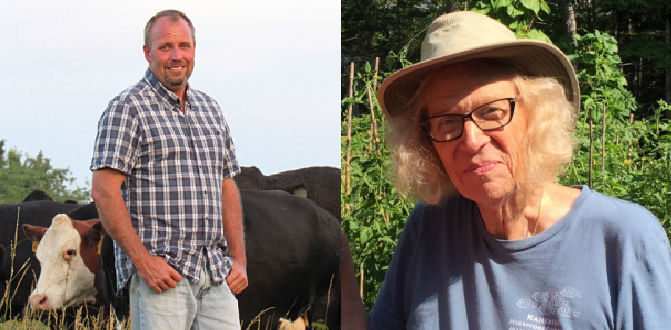Speakers to present on sustainability of agriculture
Seth Watkins (left), a fourth generation farmer at Pinhook Farms, and Jeremy Jackson (right), professor at Scripps Institution of Oceanography.
October 29, 2019
Seth Watkins and Jeremy Jackson will speak at Iowa State in regard to the sustainability of Iowa’s agriculture.
“Can Iowa Agriculture Survive” is a lecture that will be presented at 3 p.m. Wednesday in Design 101.
One of the two speakers is Watkins, a fourth generation farmer of Pinhook Farms located near Clarina, Iowa. Watkins practices many farming techniques to conserve the agricultural land that contributes to his cow-calf enterprise.
Thanh Nguyen, a graduate student in horticulture, is a part of the committee that arranged for Watkins and Jackson to speak at the lecture.
“One of our members knows [Watkins] from his work here,” Nguyen said. “[Watkins] has been farming for so long, for so many generations, that we thought he would be a good speaker.”
Watkins has implemented practices like using cover crops, no-till and crop rotation techniques on his farm. These practices impact the environment by improving the health of bodies of water that otherwise would be negatively affected by pollution or improper use.
When farmers use conservation practices, they are promoting the concept of sustainable agriculture. Cole Dutter is a graduate student in agronomy and is knowledgeable about sustainability of agriculture.
“A really good definition of sustainable agriculture is agriculture that does not overwhelm the ecosystem’s ability to remediate our waste or excesses,” Dutter said.
Along with Watkins, Jackson will also be speaking on Wednesday. Jackson is a professor at the Scripps Institution of Oceanography in La Jolla, California. He studies the ecology of tropical seas as well as what kind of impact humans have on them.
“[Watkins] was going to speak by himself and then he had just [been to] a conference with [Jackson] and was like ‘Hey, I’m going to bring this guy with me,’” Dutter said.
While the two speakers come from two different areas of expertise, both are expected to provide insight to the health of the environment. Dutter said listeners should walk away with more consideration to their impact as agriculturalists.
“I would hope that anyone leaving this lecture would think a little bit more about how their ground practices affect systems beyond their own farm,” Dutter said.







